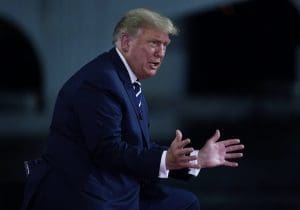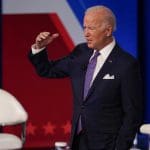Trump refuses to condemn domestic terrorist threat — again
After four years, he still says he knows ‘very little’ about violent extremists.

Donald Trump said Thursday that he knows “very little” about a group the Federal Bureau of Investigation has labeled a domestic terrorism threat.
It’s not the first time Trump has claimed ignorance about violent right-wing extremists.
In an NBC News town hall Thursday night, Trump was asked to denounce QAnon, the widely debunked conspiracy theory that claims a cabal of powerful politicians — mostly Democrats — run an international child trafficking ring.
“I know nothing about QAnon,” Trump told NBC News’ Savannah Guthrie. “I know very little.”
He added that “they are very strongly against pedophilia and I agree with that.”
Trump has previously praised QAnon as “people that love our country,” and noted that “they like me very much” and “it is gaining in popularity.” He has also habitually retweeted QAnon followers and their conspiracy theories.
Last May, an FBI intelligence bulletin warned that “conspiracy theory-driven domestic extremists” were a growing threat, and specifically mentioned QAnon.
“The FBI assesses these conspiracy theories very likely will emerge, spread, and evolve in the modern information marketplace, occasionally driving both groups and individual extremists to carry out criminal or violent acts,” the document stated.
It is unlikely that Trump actually knows nothing about the conspiracy theory and its followers. Trump presumably receives intelligence briefings as part of his presidential duties, and Fox News — Trump’s TV channel of choice — has regularly covered the QAnon movement.
This is hardly the first time Trump has feigned ignorance of violent right-wing extremists. Like other racist politicians of the past, Trump has frequently claimed to “know nothing” about white nationalist hate groups.
Last month, Trump denied any knowledge of the Proud Boys, a Southern Poverty Law Center-designated hate group. In 2018, the FBI classified the Proud Boys as an “extremist group with ties to white nationalism.”
“I don’t know who the Proud Boys are,” Trump told reporters late last month. His comments came one day after Trump told members of the group to “stand back and stand by” from the presidential debate stage.
In 2016, CNN’s Jake Tapper asked Trump if he would disavow the support he had received from former Ku Klux Klan grand wizard David Duke. In 2000, Trump repeatedly condemned Duke as a “Klansman.” Sixteen years later, Trump claimed to “know nothing” about the white supremacist leader.
“Well, just so you understand, I don’t know anything about David Duke, OK? I don’t even know anything about what you’re talking about with white supremacy or white supremacists,” Trump said at the time. “Did he endorse me, or what’s going on? I know nothing about David Duke. I know nothing about white supremacists.”
Earlier this month, the Department of Homeland Security warned in a report that right-wing violence poses the biggest domestic security threat to the United States.
“Racially and ethnically motivated violent extremists — specifically white supremacist extremists — will remain the most persistent and lethal threat in the Homeland,” the department’s report found.
Trump has repeatedly played down the threat of white nationalist violence, instead labeling anti-racist and anti-fascist protesters as his main concern.
Trump’s racist and anti-Democrat rhetoric has directly inspired right-wing attacks.
In October 2018, another Trump supporter mailed pipe bombs to several Trump critics and Democratic officials. Trump responded by applauding his arrest, but then complained that the coverage of the “bomb stuff” hurt Republicans before the midterm elections.
In August 2019, a right-wing extremist shot and killed 23 people at a Walmart in El Paso, Texas. The shooter, 21-year-old Patrick Crusius, wrote a “manifesto” that used many of Trump’s own buzzwords, including “fake news,” “open borders,” and “invasion” by Latinx immigrants. Crusius allegedly told authorities his goal was to “kill as many Mexicans as possible.”
One year after the El Paso shooting, 17-year-old Kyle Rittenhouse allegedly shot and killed two anti-racist protesters in Kenosha, Wisconsin, and injured a third protester. Rittenhouse sat in the front row of a Trump rally in January, BuzzFeed News reported.
Trump has openly defended Rittenhouse, claiming without evidence that Rittenhouse was “violently attacked” and acted in self-defense.
“That was an interesting situation,” Trump told reporters in September.
Published with permission of The American Independent Foundation.
Recommended

Biden campaign launches new ad focused on Affordable Care Act
Former President Trump has said he wants to do away with the popular health care law.
By Kim Lyons, Pennsylvania Capital-Star - May 08, 2024
Trump leaves door open to banning medication abortion nationwide
Donald Trump is planning to release more details in the weeks ahead about how his administration would regulate access to medication abortion, according to comments he made during a lengthy interview with Time magazine published Tuesday.
By Jennifer Shutt, States Newsroom - April 30, 2024
Biden on abortion rights: President expects to give speech Tuesday on new Florida 6-week ban
‘Having the president of the United States speaking out loud and with confidence about abortion access is a great thing’
By Mitch Perry, Florida Phoenix - April 22, 2024







































































